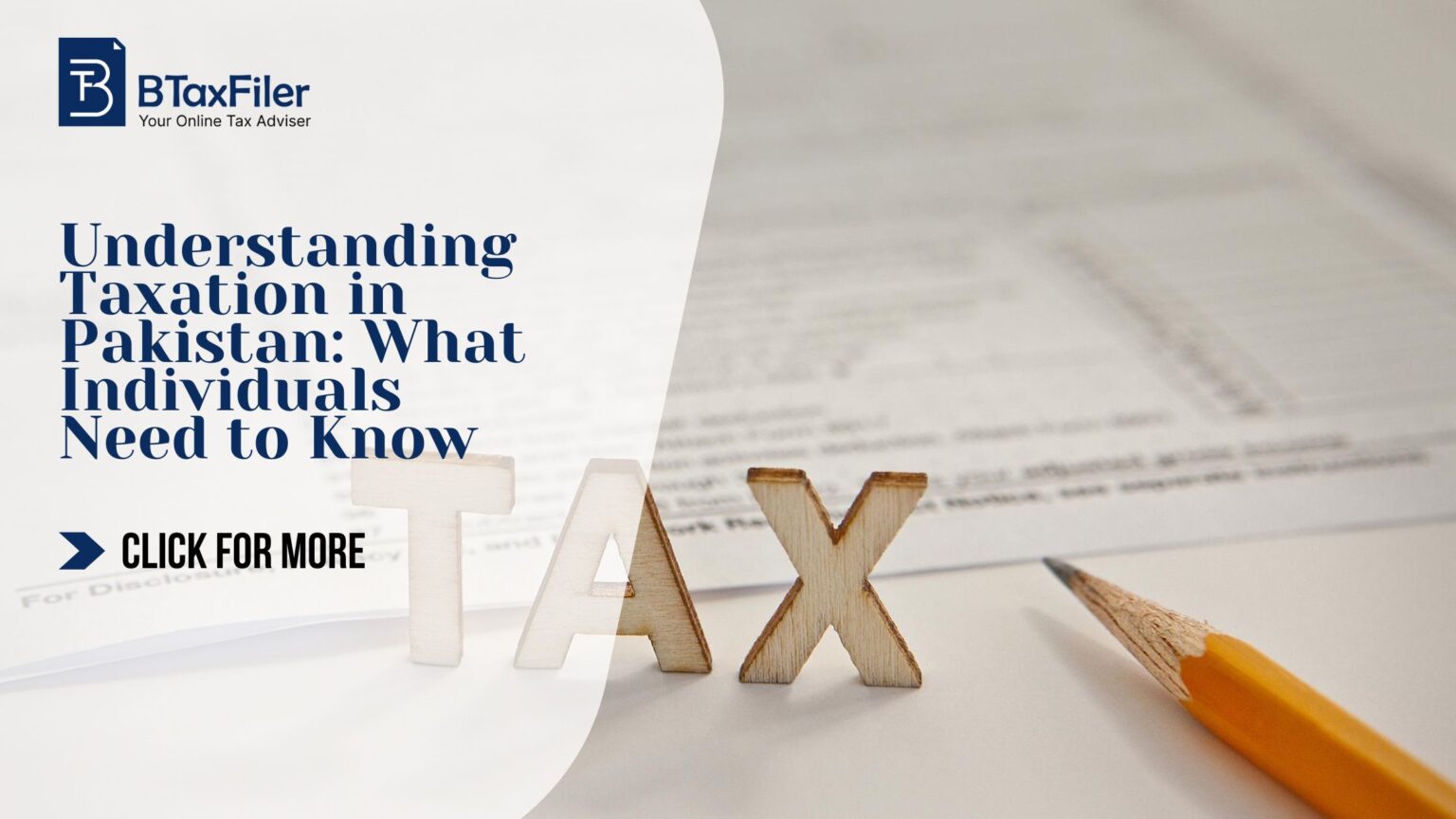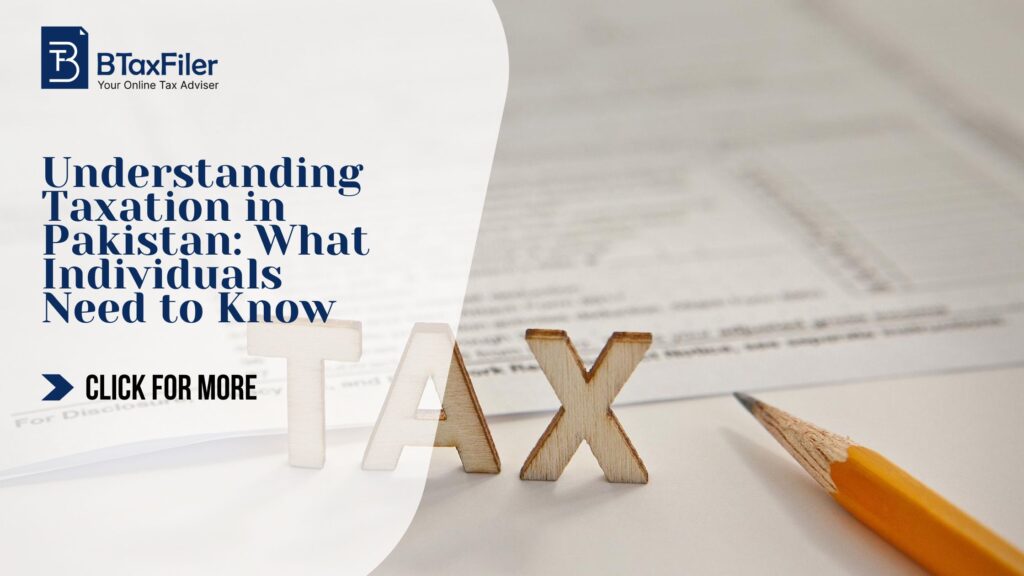Navigating the tax system in Pakistan can be daunting, especially for individuals who may not be familiar with the specific requirements, deadlines, and deductions that apply to them. This guide provides an overview of what individuals in Pakistan need to know about the tax system, including types of taxes, filing obligations, and how a tax consultant in Pakistan can help simplify the process.
Overview of the Tax System in Pakistan
The tax system in Pakistan is overseen by the Federal Board of Revenue (FBR) and includes several types of taxes that individuals may be responsible for, primarily income tax, sales tax, and property tax. Each of these taxes serves a different purpose and has distinct rules and rates.
Key Taxes for Individuals:
- Income Tax: Tax levied on income earned from employment, business, or investments.
- Sales Tax: Indirect tax on goods and services, typically included in the price.
- Property Tax: Tax on property ownership, applicable to individuals with real estate.
Understanding the types of taxes applicable to you is crucial, as failure to comply can lead to penalties.
To read more, click here to learn about How to Find the Best Tax Consultant in Pakistan
Income Tax Filing Requirements for Individuals
In Pakistan, any individual who meets specific income thresholds is required to file an income tax return annually. The filing period is usually by September 30th, although the FBR may extend this deadline. Individuals are also required to submit a wealth statement detailing their assets and liabilities if they fall under the specified income bracket.
Filing Criteria:
- Residents and Non-Residents: Residents are taxed on worldwide income, while non-residents are taxed on income sourced in Pakistan.
- Income Threshold: Individuals with annual income exceeding PKR 600,000 (for salaried) or PKR 400,000 (for non-salaried) must file returns.
- Wealth Statement: Required if you meet certain income or asset thresholds.
Filing taxes accurately and on time helps avoid penalties and ensures compliance with FBR regulations.
Common Tax Deductions and Exemptions for Individuals
One of the advantages of understanding the tax system is knowing which deductions and exemptions apply to reduce your tax burden. Pakistan’s tax system allows various deductions and credits, especially for salaried individuals and those investing in specific sectors.
Key Deductions and Exemptions:
- Zakat Contributions: Eligible for deduction as per the amount declared.
- Charitable Donations: Donations to certain charitable organizations can be deducted.
- Education and Medical Expenses: Limited deductions are available for these expenses, under specific conditions.
- Investment in Pension Funds: Contributions to approved pension funds are eligible for deductions.
Being aware of these deductions can help individuals legally reduce their taxable income and save money.
Read more, click here to know about the difference between Tax Consultant vs. Accountant in Pakistan
How Tax Consultants Assist in Personal Tax Planning
For individuals with more complex financial situations, such as multiple income sources or investments, a tax consultant can offer significant advantages. Tax consultants help in structuring finances to maximize deductions and identify opportunities for legal tax reduction.
How a Tax Consultant Can Help:
- Income Optimization: Ensuring income is reported in a way that maximizes deductions and minimizes liabilities.
- Investment Planning: Advising on tax-efficient investments like pension funds and certain tax-exempt bonds.
- Compliance and Record-Keeping: Ensuring all required documents are in place, reducing the risk of audits.
- Tax Filing and Representation: Handling filing and communicating with the FBR if necessary.
For those with high income or complex financial assets, a tax consultant provides invaluable support in maximizing tax efficiency.
Key Tax Challenges Faced by Individuals in Pakistan
Taxpayers in Pakistan often face common challenges, including navigating frequent regulatory changes, understanding complex tax codes, and dealing with the administrative demands of filing. Missing deadlines or miscalculating taxes can lead to penalties and increased scrutiny from tax authorities.
Common Challenges:
- Regulatory Changes: Frequent updates to tax laws can make it difficult to stay compliant.
- Documentation Requirements: Filing taxes requires a lot of paperwork, and missing a document can cause delays.
- Unawareness of Deductions: Many individuals miss out on tax savings simply because they are unaware of available deductions.
A tax consultant helps alleviate these challenges, making tax compliance easier and reducing the risk of errors.
Step-by-Step Guide to Filing Taxes in Pakistan
For individuals preparing to file their own taxes, understanding the steps involved can make the process more manageable.
Steps for Filing Taxes:
- Register for a National Tax Number (NTN): Required for all taxpayers in Pakistan.
- Gather Required Documents: Including salary slips, bank statements, investment records, and deduction receipts.
- Calculate Taxable Income: Sum up all sources of income, applying eligible deductions.
- File Return and Wealth Statement: Submit the income tax return and wealth statement through the FBR’s online portal.
- Pay Any Taxes Due: If there’s a tax liability after deductions, make the payment to avoid penalties.
Using the FBR’s online portal simplifies the filing process, but those with complex finances may find it beneficial to engage a tax consultant for support.
Penalties for Non-Compliance and Late Filing
Non-compliance with tax laws, whether through delayed filing or inaccurate returns, can result in penalties from the FBR. Penalties may include fines, additional tax liabilities, and increased scrutiny or audits.
Common Penalties Include:
- Late Filing Penalties: Additional fees for missed deadlines.
- Incorrect Information: Submitting incorrect data can lead to fines or re-assessments.
- Audit Risks: Non-compliance or discrepancies can increase the likelihood of an FBR audit.
Hiring a tax consultant reduces the risk of such penalties, as they ensure compliance and accuracy in tax filings.
To read more, click here to know about the Top 5 Benefits of Hiring a Tax Consultant in Pakistan
Conclusion
Understanding taxation in Pakistan is essential for individuals to ensure compliance, optimize their finances, and avoid penalties. From income tax to available deductions, knowing your tax obligations can significantly benefit your financial planning. For individuals with complex financial situations, hiring a tax consultant can simplify the process, help optimize tax savings, and provide peace of mind. Whether managing tax filing on your own or seeking professional assistance, staying informed is the key to effective tax management.







